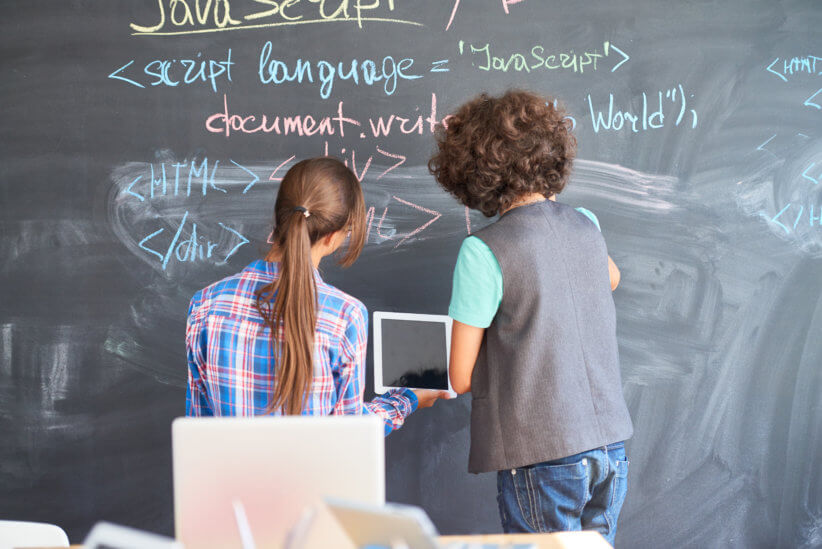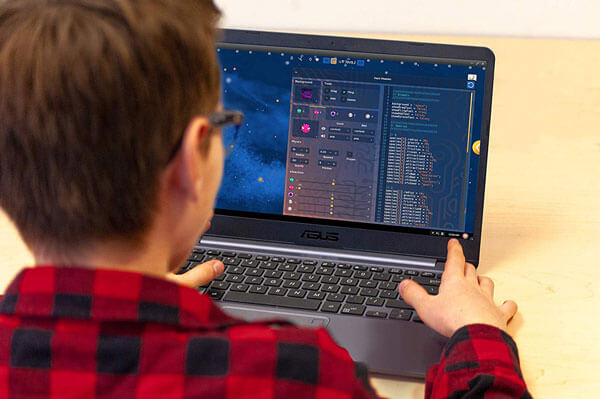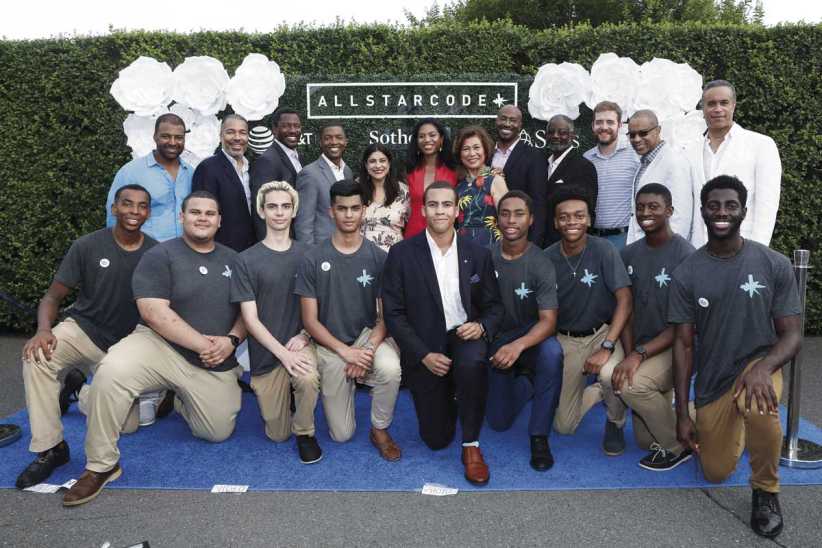
How to Get Your Kids to Love Coding
As parents, we want to expose our kids to as many intellectually stimulating and emotionally growing activities as possible. When we see our friends’ kids taking a coding class, we immediately think – “should we be signing up our kid to be the next Mark Zuckerberg?”
How exactly should we go about this? From a fancy coding camp at Stanford University to free online resources, there are a myriad of choices that can be overwhelming.
Many think that coding is like learning addition and subtraction in math. Take a few lessons to learn what a loop is and how to write an if/then and you’re done. But memorizing the definition of a loop is useless unless the student uses it to solve a problem or task. Parents have a specific language in mind when they sign up their kids for coding lessons. They might say, “My office IT uses Python. I want my kids to learn Python.” But when it comes to kids learning to code, they first need to start by unlocking their passion for creation.
Learning Coding is Like Learning a Musical Instrument
I often tell parents that learning coding is like learning to play a musical instrument. The most important criteria for choosing an appropriate instrument for your child should be the child’s enjoyment of playing that instrument. Just as a parent should not force a child to play the oboe because it will help them get into Stanford (it doesn’t), you should not force a particular coding language on a child because of some market demand for certain coding languages at a particular time.
The primary ingredient for success in coding education is motivation. While an adult might grind through coding boot camp with the promise of a high-paying job, kids are best motivated by inner joy. The most obvious inner joy is when hard work and patience is rewarded by their newly found ability to create something of value that can be shared with others. Inner joy is one of the most powerful motivations to overcome kids’ tendencies to give up when faced with a challenge.
I found that even the most technologically reticent child can be coaxed into spending a few hours per week working on code if they see that their efforts lead to creating a game or app that they can call all their own. We have seen numerous eyes light up when they make their first simple calculator (as long as they can color the keys lavender and use Lobster font) or a little Javascript animation sequence that they designed to tell a story.
Through carefully curated projects and exercises, kids gradually pick up on the way to talk to the computer. They learn to channel all the great ideas they have about what they want to build into a structure that a computer can understand. Once the code language makes sense to them, nothing can stop them from creating the next great app or algorithm.
Psst…A New Instagram for Kids Under 13 is Coming from Facebook: Here’s What You Should Know
Teaching to Debug
Beyond the basic concepts of coding like loops and conditionals, the most important thing for kids to learn is the ability to debug their own code. Once kids gain the self-confidence to debug their own code, like the proverb about teaching a man to fish to feed them a lifetime, you’ve taught them how to self-learn from the vast world of online resources for coding. No matter what programming language they need to learn, they will have the ability to overcome challenges with the assistance of billions of online resources if they possess this critical skill.
You do not learn debugging by memorization. Debugging requires an understanding of how the computer thinks and how you must adapt your commands to conform to that thinking. Kids need to develop a “sense” for what works and what doesn’t in coding without trying to memorize the rules. They must think like a computer, not memorize ten different ways to write a for a loop. As anyone who has tried to talk to Amazon’s Alex or Google Home Assistant, the computer has a certain pattern that it recognizes, and it’s useless to try to plead it to understand how we think. We must adapt our commands into phrases that it can understand.
In Coding- Don’t Sweat the Details
Some parents, especially computer programmers, want their kids to learn best practices in software development from the very beginning. I often discourage this approach. Software development best practices make sense for professional coders and those who already understand the consequences of certain coding patterns. It can be quite confusing and inexplicable for those just learning coding for the first time.
The child needs to possess some basic vocabulary to build up their computer program, but putting them together to accomplish the task should be entirely up to them. Let them discover the faults in certain approaches to problems so they can learn from their mistakes. Worrying about the most efficient way of doing something should only come after the student has gained enough experience to understand the need for such best practices.
It is cliche to expound that fact that coding opens so many doors. Almost all our teachers who learned to code after they arrived in college wish they knew to start when they were still in grade school. Coding is a lifelong pursuit, even if you never become a professional software developer. Let coding become a tool to foster your kid’s inner joy.
STEM Resources
Advantage Day Camp—The STEAM Experience
Roosevelt Island
212-935-0250
crussell@advantagecamps.net
Advantage Day Camp is where kids play a lot, learn a lot and have a fantastic time doing it! We partner with Snapology to provide our campers a STEAM program that just won’t quit. Kids enjoy hands-on, interactive experiences using LEGO® bricks, K’Nex and technology. Campers ages 5 to 14 build robotic models—a fun way to learn the basics of computer programming and engineering. Plus, campers work in teams, get to know each other and enhance their social skills. Camp also offers swimming, sports and art for the perfect well-rounded summer! All at Advantage Day Camp on Roosevelt Island.
The Cathedral School’s STEAM Camp
1047 Amsterdam Avenue
New York, NY 10025
steamcamp@cathedralnyc.org
Located on the Upper West Side, The Cathedral School’s summer STEAM Camp for ages 5-12 immerses campers in hands-on inventor projects. Our STEAM Camp sparks creativity, inspires collaboration, promotes critical thinking and perseverance through maker-centered learning. From coding robots to summertime carnivals, our campers’ days are filled with fun! The STEAM Camp is structured in two-week sessions, each capturing one overarching theme. Campers spend every morning exploring their curiosities through designing, prototyping, and testing new innovations and age-appropriate projects. They are challenged to expand their imagination and take risks under the guidance of a senior classroom teacher and camp counselors.
iD Tech
1-888-709-8324
iD Tech is the world’s premier destination for STEM education, with online programs that sharpen students’ coding, game dev, and creative skills, all from the comfort of home. Choose from Virtual Tech Camps, Online Private Lessons, or small-group Semesters. Guided by elite rockstar instructors, your child will have fun, unlock tech brilliance, and join a community of 500,000 aspiring innovators.
Launch Math+Science Centers
Two locations in Manhattan: UWS & Tribeca
212-600-1010
info@launchmath.com
Launch Math + Science Centers offer exciting and educational, on-site, one-week STEM summer camps for kids from kindergarten to 7th grade (5-12 years old). Campers discover the magic of chemistry, explore the allure of faraway lands, think like detectives, animate their favorite characters – and that’s just the beginning! Camps are packed with hands-on STEM projects! Plus, there are NEW exciting camps and daily segments, like Launch Studios where kids document camp activities, plan “How-to” videos, perform fun skits, and more. Virtual camp options also available! Register today to receive multi-camp/sibling discounts of $75 off every additional camp week after the first. In addition, Launch’s inspiring mathematics programs range from enrichment to intensive tutoring and serve as a great way to address the widespread learning loss from this past school year.
New Settlement Community Center
1501 Jerome Avenue, Bronx NY
718-758-5901
The New Settlement Community Center, also known as NSCC, is excited to reopen its doors to the public on July 6th, 2021. They’ve been preparing all year for a safe reopening, and are thrilled the STEAM program, known as “Tech Crew”, is returning! Geared for ages 7 to 12, participants will learn primary coding languages such as HTML, Python, and Scratch, the concept of game design, and will create their own video game to share with friends and family. They will also be able to build robots from scratch and program simple commands. For more information about NSCC, call them at 718-758-5901.
Penguin Coding School
424 7th Avenue, Brooklyn NY 11215
347-620-9235
Located in Park Slope Brooklyn Penguin Coding School teaches computer programming to children ages 6-18 in both in-person and online classes. Our curriculum takes the most interesting coding projects from adult coding bootcamps and makes them fun and accessible to kids. We teach a variety of languages such as Javascript, Python, Scratch, Java and HTML. Using a project based model kids leave each class with a smile. Our methods and teachers have turned hundreds of kids into passionate coders. Penguin Coding is open year round with a summer camp and after school classes.
STEAM into SCA
St. Catharine Academy Summer Camp
2250 Williamsbridge Road
Bronx, NY 10469
718-882-2882
STEAM into SCA is a camp that inspires girls to love math and science. It is a three-week summer program that combines academic coursework in Math and English while exploring the arts and sciences, such as robotics, art and dance. Rising 6th, 7th, and 8th grade girls are able to make new friends as they enjoy activities such as athletics and games. July 12th – July 30th from 9am to 2pm. The program fee is $500 which includes course materials and a t-shirt.






















